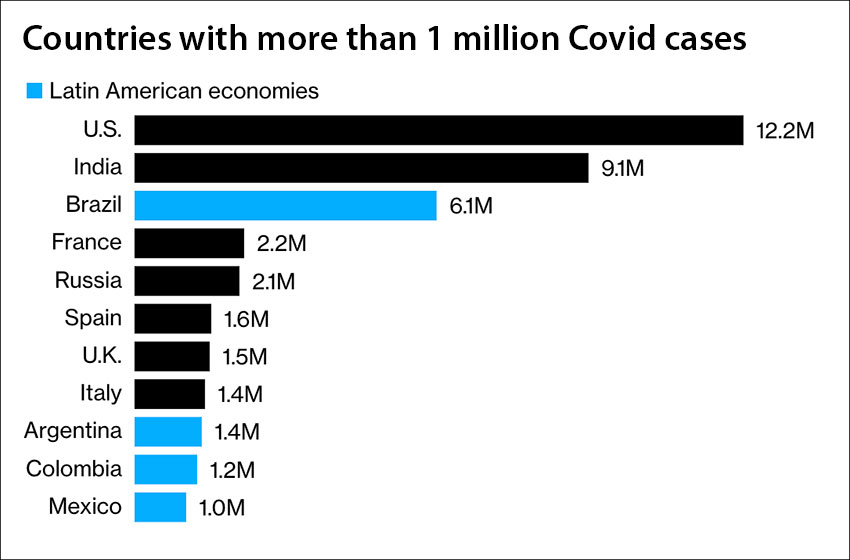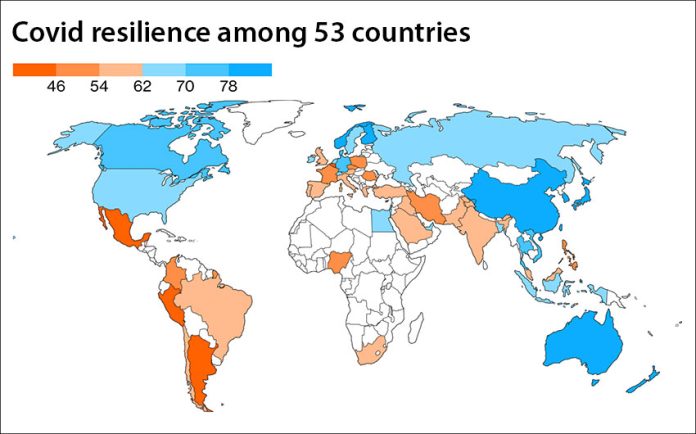Mexico is the worst country to be in during the coronavirus pandemic, according to an analysis conducted by the Bloomberg news agency.
Using 10 different indicators including growth in coronavirus cases, Covid-19 mortality, testing capacity and the vaccine supply agreements governments have reached, Bloomberg graded 53 countries with economies larger than US $200 billion to determine where the virus has been handled most effectively with the least amount of disruption to business and society.
Mexico ranked 53rd with a “Covid resilience” score of just 37.6 out of 100.
Among the other indicators Bloomberg considered were the capacity of the health system in each of the 53 countries, the impact of coronavirus restrictions on the economy and citizens’ freedom of movement.
Mexico was graded particularly poorly for its Covid-19 fatality rate over the past month (8.6 deaths per 100 cases, according to Bloomberg), positivity rate (62.3%) and “lockdown severity” (the federal government never enforced a strict lockdown).
One positive Bloomberg identified is that the Mexican government has reached three separate vaccine supply agreements.
New Zealand, where the government has largely achieved the elimination of the coronavirus, came out on top with a “Covid resilience” score of 85.4. Japan and Taiwan ranked second and third, respectively.
The “Covid resilience” score for Mexico – where confirmed coronavirus cases and Covid-19 deaths recently passed 1 million and 100,000, respectively – was 3.5 points lower than that of Argentina, which ranked second last, and four points below that of Peru, which ranked third last.
Despite having the highest case tally and death toll in the world, the United States ranked 35 places above Mexico in 18th spot with a score of 66.5. Mexico’s other North American trade partner, Canada, ranked 13th with a score of 73.2.
In a brief written explanation of why Mexico ranked last, Bloomberg said “the nation’s latest available positive test rate is a whopping 62%, suggesting undetected infection is widespread.”
It also noted that “Mexican officials have acknowledged that the country’s death toll is likely significantly higher than official data, due to limited testing.”

In addition, Bloomberg said that President López Obrador, like Donald Trump of the United States and Jair Bolsonaro of Brazil, has “repeatedly downplayed the coronavirus threat.”
The news agency also noted that Latin America is the most urbanized region in the world and that social distancing is difficult for many people because they live in crowded conditions. “The high proportion of people who rely on informal work and daily wages means that few are willing to stay home,” it added.
According to the International Monetary Fund (IMF), most Latin American countries won’t see economic growth return to pre-pandemic levels until 2023 and per-capita income won’t recover until 2025.
Among the 53 countries assessed by Bloomberg, the IMF forecasts that Mexico will see the 10th biggest economic downturn in 2020 with a 9% recession predicted.
Bloomberg said its rankings are not indicative of “a final verdict” on the impact of the coronavirus and countries’ response to it, acknowledging that they could never be due to “imperfections in virus data and the fast pace of this crisis, which has seen subsequent waves confound places that handled things well the first time around.”
It said that its scores and rankings “will change as countries switch up their strategies, the weather shifts and the race intensifies for a viable inoculation.”
However, with winter approaching here, a recent increase in case numbers and the federal government ruling out any possibility of implementing strict lockdowns and a nationwide face mask order, it appears highly unlikely that Mexico will rise in the rankings any time soon.
“The gap that has opened up between those economies at the top and those at the bottom is likely to endure,”Bloomberg said, adding that there will potentially be “lasting consequences in the post-Covid world.”
Source: Bloomberg (en)
